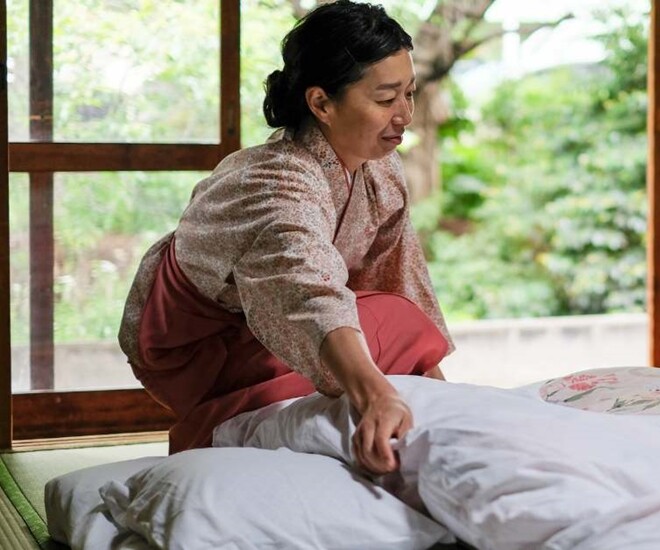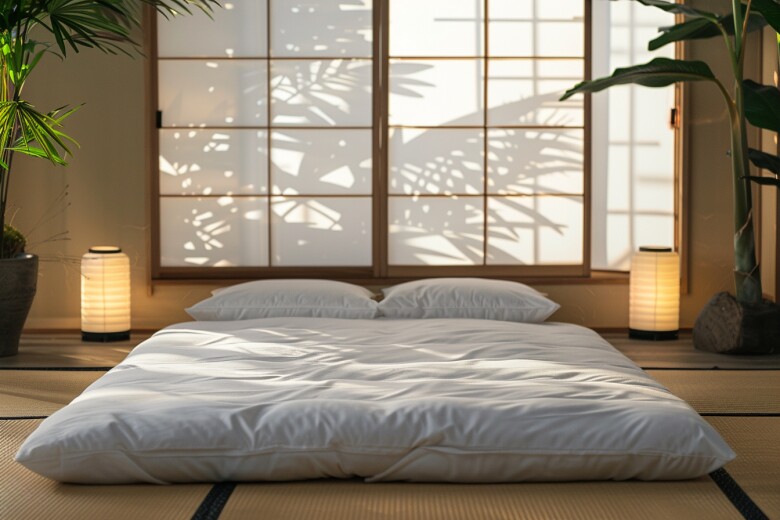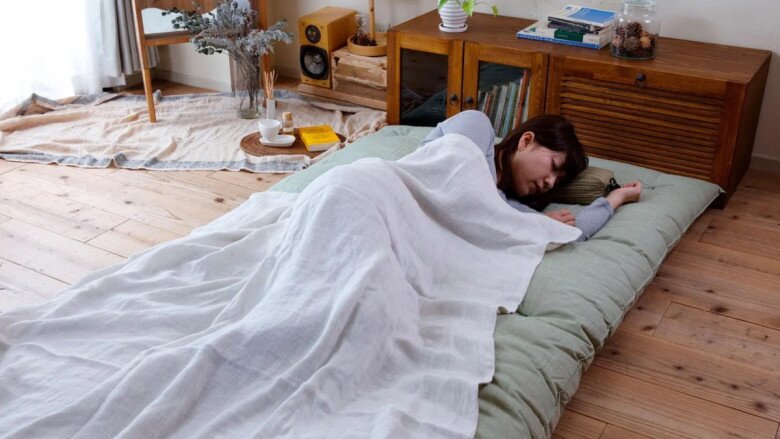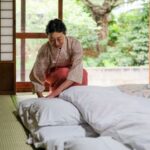While Japan is a developed country with modern skyscrapers, its citizens, regardless of wealth, tend to choose sleeping on the floor over a tall bed. So why do they have this habit? The answer lies in the surprising benefits that this sleeping arrangement offers.
1. Optimizing limited living space
The Japanese are renowned for their minimalist and efficient use of living space, especially in small homes or apartments. With costly land prices, many Japanese families live in restricted spaces where saving area is a top priority. Bulky beds would occupy a significant portion of the room, reducing the bedroom space.

In contrast, a futon – a thin mattress that the Japanese lay directly on the floor – can be easily folded and stored away in the morning, creating more space for other activities like entertaining guests, studying, or working. This is especially useful in small apartments to maximize every square meter.
This convenience has made futons a popular choice across all social strata in Japan. Not just those with low incomes, but also wealthy families appreciate the flexibility that futons offer, allowing them to create multifunctional living spaces.
2. Connection with nature and traditional culture
The Japanese maintain a close association with nature, reflected in their living space design. Sleeping on the floor allows them to feel closer to the ground – an essential aspect of Japanese philosophy. They often use tatami mats, traditional straw mats with excellent moisture absorption, creating a breezy and comfortable environment.
For the Japanese, sleeping on a futon laid on a tatami mat provides not only comfort but also a connection to their traditional culture. Tatami mats create a healthy environment by deodorizing and regulating the air.

3. Safety for children and earthquake preparedness
Another crucial factor in the Japanese preference for sleeping on the floor is safety, especially for young children. When kids sleep on a futon close to the floor, the risk of falling is minimized compared to sleeping on a tall bed. This gives Japanese parents peace of mind, especially those with energetic toddlers who love to jump around.
Additionally, Japan is located in an earthquake-prone region. During strong tremors, lying on the floor is much safer than sleeping on a high bed. One can easily sense the vibrations and quickly move to safety. This sleeping habit is a form of self-protection for the Japanese during emergencies, and it is one of the primary reasons many continue this practice.
4. Improved sleep and posture
Beyond space and safety considerations, sleeping on the floor offers health benefits, particularly for the spine. When lying on a futon, the body maintains a natural posture, providing better spinal support than overly soft or sinking beds. For those with back problems, sleeping on a flatter surface can reduce back pain and improve sleeping posture.
Moreover, sleeping on the floor helps maintain a stable body temperature. In summer, the cool floor reduces body heat, while in winter, the tatami mats and thicker futons provide better insulation, ensuring comfort.
These benefits contribute to a deeper and more restful sleep and positively impact long-term health.

5. Encouraging a neat and tidy lifestyle
Japanese culture emphasizes neatness and tidiness in daily life. Using futons requires the Japanese to clean and arrange their bedrooms daily, fostering a habit of keeping their homes spotless. After waking up, the futon is folded and stored away, ensuring a neat and airy bedroom.
Not having a fixed bed also prevents the room from becoming cluttered and allows for multifunctionality. The Japanese often use this space for various activities throughout the day, from hosting guests to family gatherings. This reflects the Japanese minimalist and refined lifestyle, where each household item is efficiently and scientifically utilized.
In conclusion, the Japanese exhibit intelligence in their sleeping habits. Regardless of wealth, they maintain the practice of sleeping on the floor, optimizing their living space and fostering a connection with nature. This habit also improves sleep quality, ensures safety during emergencies like earthquakes, and promotes a neat lifestyle. It is a valuable lesson anyone can learn from and apply to their daily lives.



































